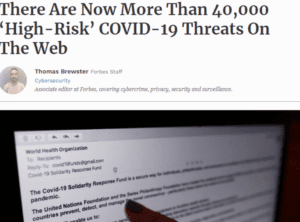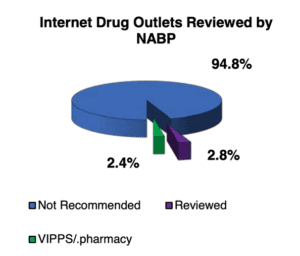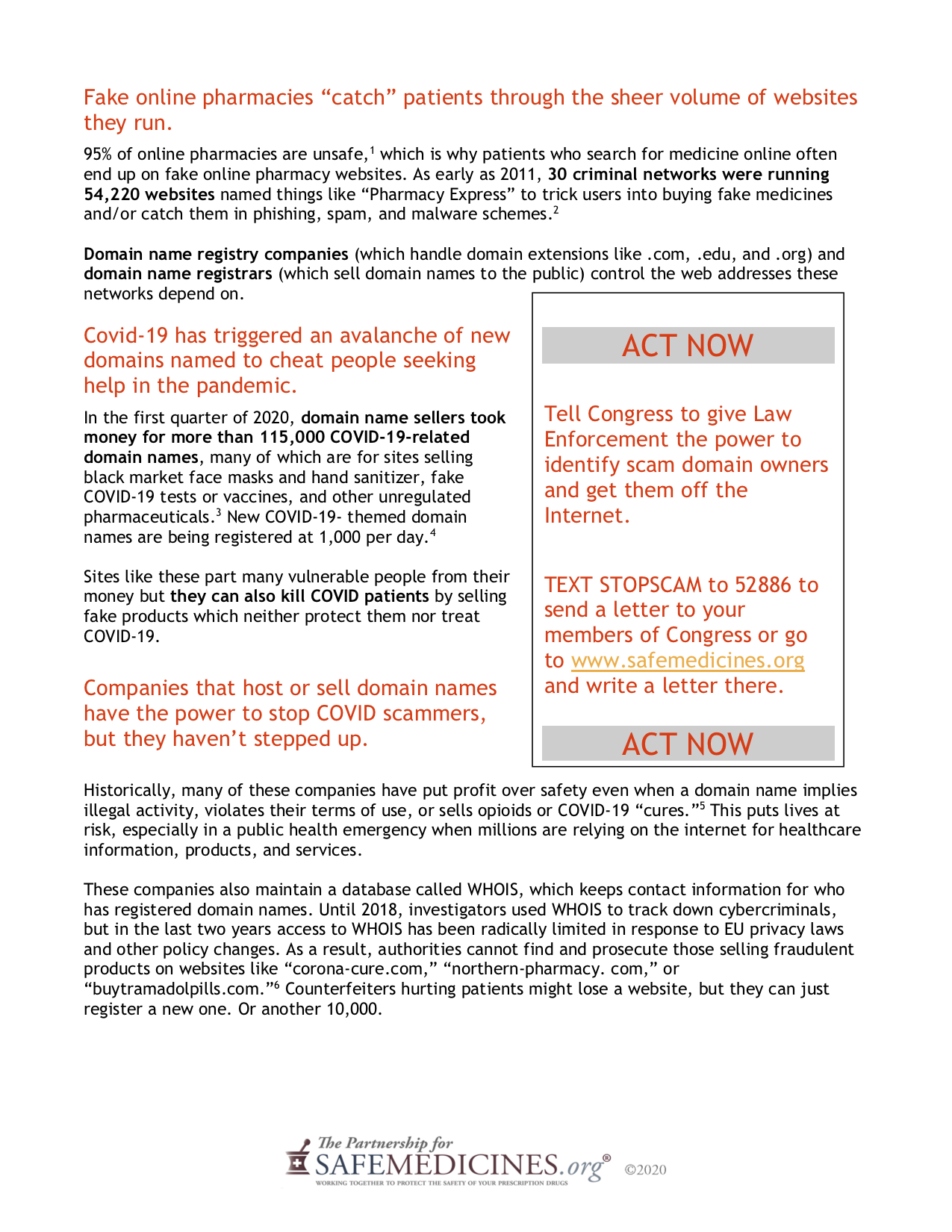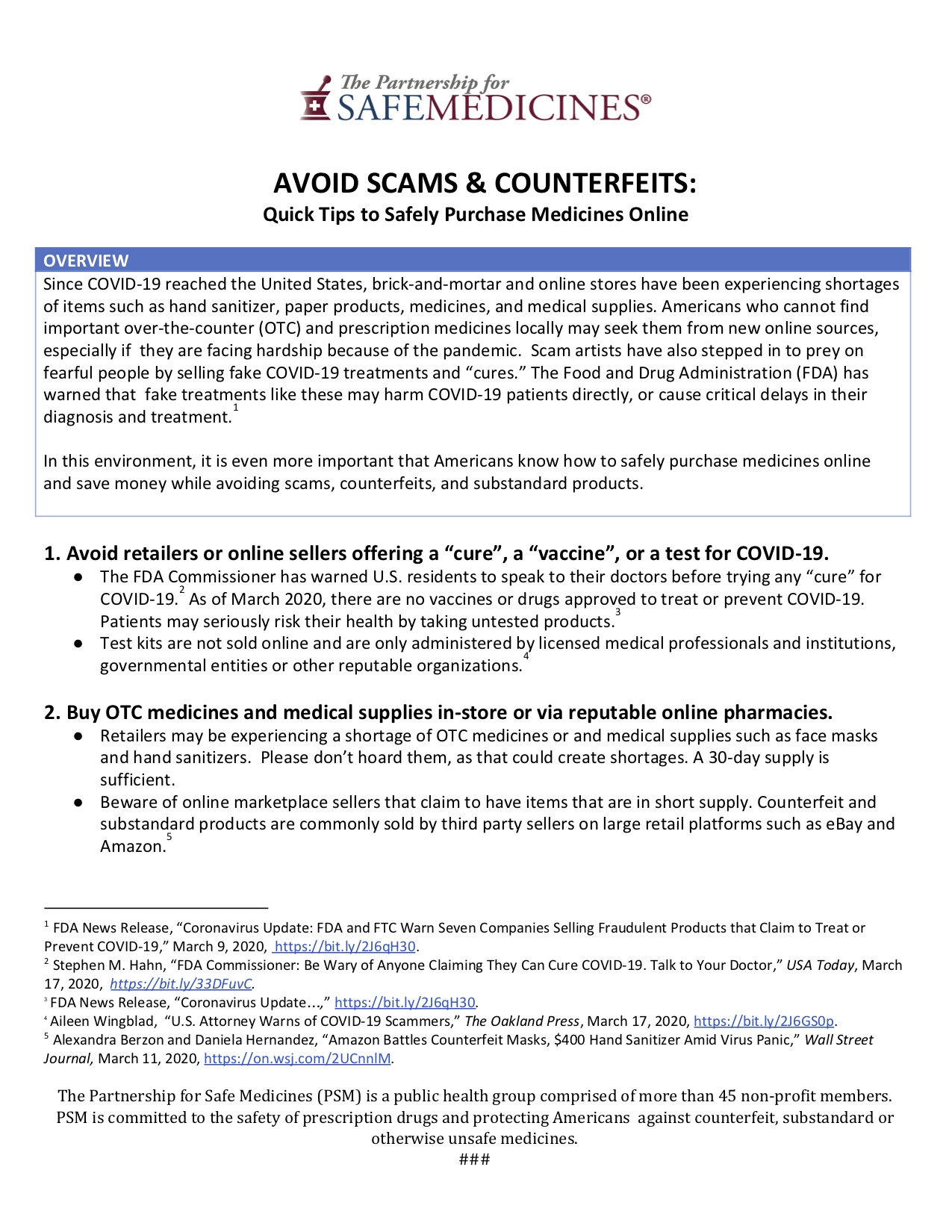May 6, 2020 video: To protect us from #COVIDscams, we need domain name reform
Last week’s #COVIDscams video focused on the FDA’s heroic role protecting U.S. patients from dangerous and ineffective treatments and unreliable medical equipment. The FDA has been doing that work for more than a hundred years and it continues to do it during the pandemic.
Online criminals of many different stripes—including black marketers selling “Canadian” counterfeit medicines—have preyed upon the vulnerable since the commercial Internet first emerged. The FDA began to take on fake Canadian online pharmacies in the mid-2000s. One example, Mediplan Prescription Plus Pharmacy, run by Candian pharmacist Andrew Strempler, filled prescriptions for U.S. patients who ordered them through websites with names like RxNorth.com, Canadiandrugstore.com or www.Canadian-safe.com. In 2006, the FDA seized a shipment from Mediplan and found that as many as 90% of the medicines inside—cholesterol drugs, anti-inflammatories, even a cancer treatment—were counterfeit. It would be 2013 before Strempler was prosecuted and sentenced to four years in prison for selling counterfeit medicine to American patients.
Cases like these are still relevant: nearly 95% of online pharmacies are unsafe and they sell medicine to U.S. patients everyday. The scale is immense: As early as 2011, a study found 54,220 fake drug-selling websites being run by 30 criminal networks who hoped to trick users into buying fake medicines and/or catch them in phishing, spam, and malware schemes.
But today law enforcement is fighting these criminals with one hand tied behind their backs. This week, we want to talk about reforms that are critical to help FDA and other investigators protect us from counterfeiters working online.
Re-open WHOIS data:
One of the first things law enforcement does when it identifies a website being used for criminal purposes is try to find out who owns its “domain name,” its internet address. Anyone who wants to run a website from a specific internet address has to buy a “domain name” from a licensed domain registrar. Until 2018, internet users used a directory called “WHOIS” to determine who had purchased a domain name. In the last two years, however, access to WHOIS has been radically limited in response to European privacy laws and other policy changes. Law enforcement can no longer see the name of the person who registered the domain or any of their contact information.
This impediment is bad enough if an investigator has to identify the owners of 5 or 150 website names, but it’s overwhelming if they have to identify thousands. The result is that authorities cannot find and prosecute those selling fraudulent products on websites like “corona-cure.com,” “northern-pharmacy. com,” or “buytramadolpills.com.” Counterfeiters hurting patients might lose a website, but they can just register a new one. Or another 10,000.
Require sellers to suspend domain names during criminal investigations:
If law enforcement provides evidence that someone is using a website to commit a crime like selling opioids without a pharmacy license or fraudulent COVID-19 treatments, responsible domain name sellers will lock that domain so it can’t be used until the legal action is resolved. But there are more than 2,000 licensed domain name sellers, and not all of them are responsible. Historically, many of these companies have put profit over safety even when a domain name implies illegal activity, violates their terms of use, or sells opioids or COVID-19 “cures.” Some domain name sellers have become havens for criminals because they don’t answer calls when law enforcement presents evidence of criminal wrongdoing.
Why is this critical now?

Source: April 22, 2020 Forbes article
In the first quarter of 2020, domain name sellers took money for more than 115,000 COVID-19-related domain names, many of which are for sites selling black market face masks and hand sanitizer, fake COVID-19 tests or vaccines, and other unregulated pharmaceuticals. New COVID-19-themed domain names are being registered at 1,000 per day. Sites like these part many vulnerable people from their money but they can also kill COVID patients by selling fake products which neither protect them nor treat COVID-19.
Last month, PSM joined a broad coalition of advocates for patient safety asking Vice President Mike Pence to help make industry best practices into law. We’re asking organizations and individuals to write Congress right now and tell them to put these two fixes into the next stimulus package.
For curious viewers, the book over Shabbir's left shoulder is "Opioid, Indiana" a novel about the opioid crisis by Brian Allen Carr.
Sources for this week’s video:
- "FDA Warns Consumers Not to Buy or Use Prescription Drugs from Various Canadian Websites that Apparently Sell Counterfeit Products," U.S. Food and Drug Administration, August 30, 2006.
- "Former Internet Pharmacist Sentenced in Fake Drug Case," The Wall Street Journal, January 9, 2013.
- National Association of Boards of Pharmacy, “Internet Drug Outlet Identification Program Progress Report for State and Federal Regulators: September 2018.”
- Levchenko et al., "Click Trajectories: End-to-End Analysis of the Spam Value Chain," 2011 IEEE Symposium on Security and Privacy, Berkeley, CA, 2011.
- “Don’t Panic: COVID-19 Cyber Threats.” Palo Alto Networks Unit 42 blog, March 24, 2020. “ICE HSI launches Operation Stolen Promise,” U.S. Immigration and Customs Enforcement, April 15, 2020.
- “Domain Name Registration Data at the Crossroads: The State of Data Protection, Compliance, and Contactability at ICANN.” Interisle Consulting Group, LLC, March 31 2020.
- FDA Presentation at ASOP Global Foundation Research Symposium, November 2018; See also FDA Registry and Registrar Abuse Complaints.
- Letter from the Center for Drug Evaluation and Research and the Federal Trade Commission to Corona-cure.com, March 27, 2020.
There are many more scams we can’t fit into our weekly episode. Follow us on Facebook, Twitter or Linkedin to get them. Read all our COVID-19 coverage.
Domain name reform is critical for patient safety
Tell Congress to give law enforcement the power to identify scam domain owners and get them off the Internet.
Share our one-pager about domain name reform to help others understand why. TEXT STOPSCAM to 52886 to send a letter to your members of Congress, or submit your letter here.
Adopt our Covid Safety campaign!
Post our one pager to your website and to social media. Use the hashtag #covidscams to help raise awareness of criminals using the crisis to prey on people. Drop us a note at editors@safemedicines.org to let us know you're helping!


